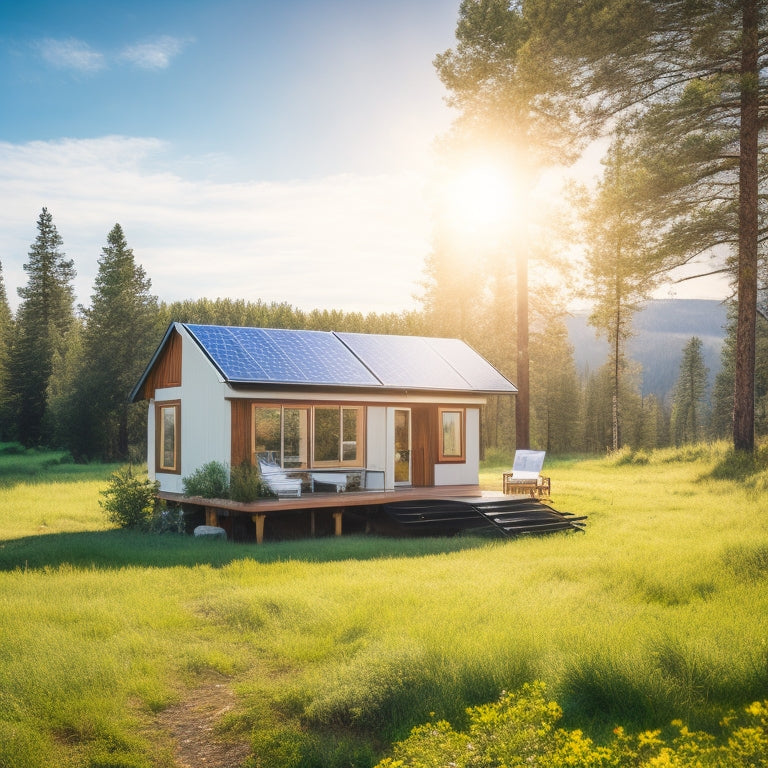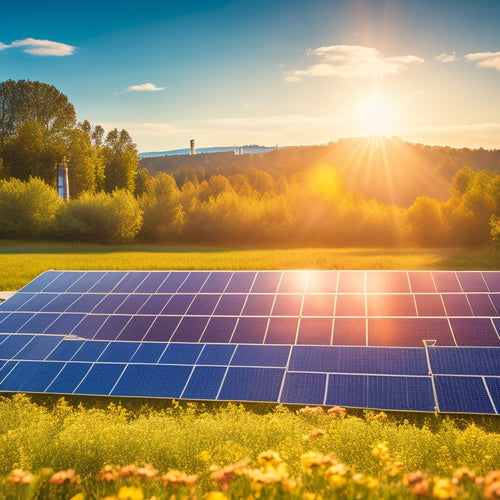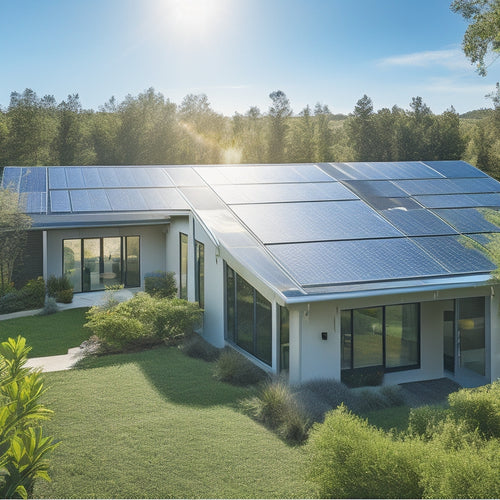
What to Look for When Buying Off-Grid Solar Online
Share
When purchasing off-grid solar systems online, you'll need to carefully assess multiple components to guarantee a reliable and efficient system that meets your energy needs. Start by verifying compatibility between components, selecting durable solar panels with high-efficiency ratings, and choosing the right inverter type and battery capacity for your system. Don't forget to take into account charge controller capabilities, mounting and installation options, and warranty and customer support. By taking into account these key factors, you'll be well on your way to designing an off-grid solar system that meets your energy needs. As you dig deeper, you'll discover more nuances to ponder, but this foundation will serve you well.
Key Takeaways
• Ensure compatibility of system components, including grid ties, solar panels, and inverters, to prevent system downtime and optimize energy production.
• Choose high-quality solar panels with durable materials, robust construction, and weather-tight enclosures to withstand harsh environmental conditions.
• Select an efficient inverter with a high efficiency rating, surge protection, and MPPT technology to maximize energy harvesting and storage.
• Consider the type and capacity of batteries, including Flooded Lead-Acid (FLA) and Sealed Lead-Acid (SLA) options, and ensure compatibility with the solar panel array and inverter.
• Verify the charge controller's features, including MPPT technology, efficient energy harvesting, and protection features like overcharge and short-circuit protection, to ensure safe and efficient energy storage.
System Compatibility and Integration
When purchasing off-grid solar online, you'll need to verify that your system components are compatible and integrated seamlessly to maximize energy harvest and system reliability.
A well-designed system architecture is essential to guarantee peak performance, and it starts with selecting the right grid ties. Grid ties, also known as inverters, convert DC power from your solar panels to AC power for your home or business. Look for grid ties with high efficiency ratings (>95%) and a wide maximum power point tracking (MPPT) range to ensure maximum energy harvest. Additionally, consider grid ties with built-in monitoring capabilities to track your system's performance remotely.
Ensure your grid tie is compatible with your solar panel array's voltage and current output to prevent system downtime. A well-integrated system also requires a compatible charge controller, battery bank, and mounting hardware. Verify that all components are designed to work together seamlessly to ensure a reliable and efficient off-grid solar system.
Panel Quality and Durability
When buying off-grid solar panels online, you need to take into account the quality and durability of the panels, as they'll be exposed to various environmental conditions.
You'll want to guarantee the panels are built with high-quality materials and construction to withstand harsh weather conditions.
Material and Construction
You'll want to look for off-grid solar panels built with durable materials and a robust construction that can withstand harsh environmental conditions, guaranteeing peak energy output and a long lifespan. The frame durability is a critical aspect to take into account, as it affects the panel's structural integrity. Look for frames made from anodized aluminum or stainless steel, which offer excellent corrosion resistance and strength. A sturdy frame will guarantee the panel remains secure, even in extreme weather conditions.
When it comes to enclosure types, you'll want to opt for panels with a durable and weather-tight enclosure. IP65 or higher-rated enclosures are ideal, as they provide a high level of protection against solid objects and water ingress. Additionally, consider panels with a tempered glass or a high-transparency low-iron glass cover, which allows for maximum energy absorption while withstanding environmental stresses.
Weather Resistance
With off-grid solar panels, a minimum IP65 rating is essential to guarantee that the electrical components are shielded from dust and water ingress, securing peak performance even in harsh environmental conditions. As you're shopping online, make sure the panels you choose have a rating that can withstand the elements. You don't want your investment to be compromised by a little rain or dust.
Here are three key aspects of weather resistance to look for:
-
UV protection: The panels should have a UV-resistant coating to prevent degradation from intense sunlight.
-
Moisture barriers: The panels should have a waterproof seal to prevent water from seeping in and damaging the electrical components.
-
Durable frames: The frames should be made of corrosion-resistant materials, such as anodized aluminum, to withstand harsh weather conditions.
When you're buying off-grid solar panels online, don't compromise on weather resistance. It's essential to ensure your investment will last for years to come, even in the toughest environments.
Inverter Type and Efficiency
When purchasing off-grid solar online, you'll need to take into account the inverter type and efficiency to guarantee your system runs smoothly and efficiently.
You'll have to choose between string inverters, which are the most common type, and other options like microinverters or power optimizers.
As you weigh your options, bear in mind that inverter efficiency ratings can greatly impact your system's overall performance and energy yield.
String Inverter Options
String inverters, the workhorses of off-grid solar systems, come in various types, each boasting distinct efficiency ratings that greatly impact your renewable energy setup's overall performance. When buying online, you'll encounter different string inverter options, each with its strengths and weaknesses.
Here are three key considerations to keep in mind:
-
Grid Tied vs. Off-Grid: Will your system be connected to the grid or operate independently? Grid-tied inverters synchronize with the grid frequency, while off-grid inverters provide power autonomy.
-
Surge Protection: Look for inverters with built-in surge protection to safeguard your system from power spikes and electrical storms.
-
Maximum Power Point Tracking (MPPT): Make sure your inverter features MPPT to optimize energy harvesting from your solar array.
When selecting a string inverter, consider your specific needs and prioritize features that align with your off-grid solar goals. By understanding these options, you'll make an informed decision that maximizes your renewable energy investment.
Efficiency Ratings Matter
You're likely aware that different inverter types boast varying efficiency ratings, which have a substantial impact on your off-grid solar system's overall performance. Inverters with high efficiency ratings can greatly reduce energy losses, resulting in more power for your off-grid needs.
When shopping online, look for inverters with high efficiency ratings, typically above 95%. This guarantees minimal energy waste and peak system performance.
When evaluating inverter efficiency, consider the European Efficiency (%), California Energy Commission (CEC) rating, and the International Electrotechnical Commission (IEC) certification. These metrics provide a standardized measure of an inverter's ability to convert DC power to AC. A higher rating indicates a more efficient inverter, resulting in more usable energy.
Additionally, make sure the inverter meets relevant solar certification standards, such as UL 1741 or IEC 62109, to ensure compliance with industry regulations. By prioritizing efficiency ratings and certifications, you'll maximize your off-grid solar system's energy output and minimize energy waste.
Battery Type and Capacity
With your off-grid solar system's power requirements defined, selecting the right battery type and capacity becomes a critical next step. You'll need a battery that can store excess energy generated by your solar panels during the day, and provide power when the sun goes down.
When choosing a battery, you'll encounter two main types: Flooded Lead-Acid (FLA) and Sealed Lead-Acid (SLA). For off-grid solar systems, Deep Cycle batteries are the way forward. These batteries are designed to provide a steady flow of energy over a long period, making them ideal for off-grid applications.
Here are three key factors to take into account when selecting a Deep Cycle battery:
-
Depth of Discharge (DOD): Look for a battery with a high DOD, as it will provide more usable energy.
-
Cycle Life: A higher cycle life means your battery will last longer and require less maintenance.
-
Battery Maintenance: Reflect on a battery with minimal maintenance requirements, such as SLA batteries, to reduce upkeep and extend its lifespan.
Charge Controller Capabilities
Your battery selection is just the starting point, as the charge controller plays a vital role in regulating the energy flow from your solar panels to your battery bank.
When purchasing off-grid solar online, it's important to take into account the charge controller's capabilities to guarantee efficient energy harvesting and storage. Look for a controller with Maximum Power Point Tracking (MPPT) technology, which optimizes energy production by identifying the maximum power output of your solar panels. This technology ensures you're maximizing the potential of your solar array.
Additionally, surge protection is critical to protect your system from voltage spikes and electrical storms. A good charge controller should have built-in surge protection to prevent damage to your battery bank and other system components.
When selecting a charge controller, consider the maximum charging current, voltage, and power rating to ensure it aligns with your system's requirements. By choosing a suitable charge controller, you'll establish a reliable and efficient off-grid solar system.
Mounting and Installation Options
Properly securing your solar panels is crucial to the overall performance and longevity of your off-grid solar system. Selecting the right mounting and installation options is essential to achieving this goal. When buying off-grid solar online, you'll need to take into account the unique challenges of your installation site. These include roof size, tilt angles, and local building codes.
To guarantee a successful installation, consider the following key factors:
-
Roof size and layout: Make sure your solar panels fit comfortably on your roof, with sufficient clearance from obstructions like vents, skylights, and chimneys.
-
Tilt angles and orientation: Optimize your panel angle and orientation to maximize energy production. Consider your location's latitude and seasonal variations.
-
Mounting hardware and tracking systems: Choose durable, weather-resistant mounting hardware and explore tracking systems that adjust to seasonal changes. This ensures efficient energy harvest.
Warranty and Customer Support
When purchasing off-grid solar systems online, you need a dependable warranty and dedicated customer support to guarantee that any issues are quickly resolved and your system operates at peak performance. A thorough warranty ensures that you're protected from faulty components and workmanship, giving you peace of mind and financial security. Look for a warranty that covers at least 25 years for the solar panels and 10 years for the inverters and other components. Additionally, investigate the return policy in case you need to return or exchange any defective parts.
Beyond the warranty, it's crucial to evaluate the customer support offered by the online retailer. Check their support hours to ensure they're available when you need them. Are they available 24/7 or only during limited hours? Do they offer multiple communication channels, such as phone, email, and live chat? A responsive customer support team can make all the difference in resolving issues quickly and minimizing system downtime.
Frequently Asked Questions
Can I Install an Off-Grid Solar System Myself?
When considering a DIY off-grid solar installation, you'll face DIY challenges and significant safety concerns, such as electrical shock and fire hazards, so it's important to weigh your skills and expertise before attempting a self-install.
Are Off-Grid Solar Systems Suitable for Small Cabins?
When considering off-grid solar for your small cabin, you'll want to assess your energy needs based on cabin size and remote living requirements, ensuring a system that efficiently powers your off-grid lifestyle.
Can I Add More Panels to My System in the Future?
When you need more power, you can expand your system by adding compatible panels, ensuring they match your existing system's voltage and connector type, making system expansion a seamless process with proper panel compatibility.
Do Off-Grid Solar Systems Work During Power Outages?
When the grid goes down, you'll stay powered up with an off-grid solar system, providing backup power during outages, ensuring grid reliability isn't a concern, and keeping your essential appliances running smoothly.
Are Off-Grid Solar Systems Environmentally Friendly?
You're wondering if off-grid solar systems are environmentally friendly? Absolutely! By harnessing renewable energy from the sun, you dramatically reduce your carbon footprint, making off-grid solar a sustainable choice for a greener future.
Related Posts
-

Advantages of Solar Generating Systems Over Traditional Energy
Solar generating systems provide several key advantages over traditional energy sources. You'll experience lower long...
-
Average Lifespan of Solar Battery Banks
The average lifespan of solar battery banks generally ranges from 5 to 15 years. This variation mainly stems from the...
-

Installing Metal Solar Roofs for Maximum Energy Efficiency
Installing metal solar roofs can drastically enhance your home's energy efficiency and durability. These roofs withst...

